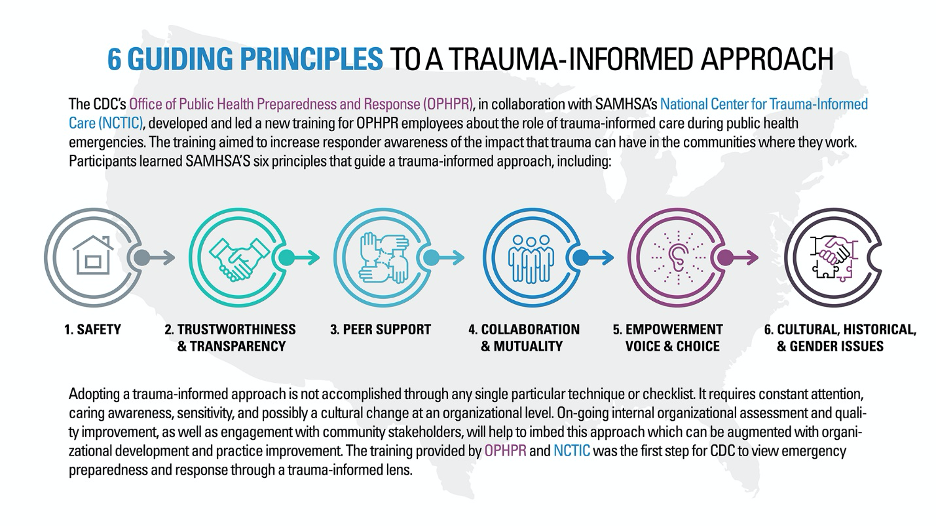SAMHSA’s trauma informed approach is guided by 4 assumptions and 6 key principles, listed below:
(SAMHSA is the Substance Abuse and Mental Health Services Administration)
Key Assumptions: The 4 R’s. A trauma informed organization
- Realizes the widespread impact of trauma and understands potential paths for recovery
- Recognizes the signs and symptoms of trauma in clients, families, staff, and others involved with the system
- Responds by fully integrating knowledge about trauma into policies, procedures, and practices
- Resists re-traumatization
https://ncsacw.samhsa.gov/userfiles/files/SAMHSA_Trauma.pdf
The following stages form the basis of creating a trauma-informed organization:
- Commit to creating a trauma-informed agency.
- Create an initial infrastructure to initiate, support, and guide changes.
- Involve key stakeholders, including consumers who have histories of trauma.
- Assess whether and to what extent the organization’s current policies, procedures, and operations either support TIC or interfere with the development of a trauma-informed approach.
- Develop an organizational plan to implement and support the delivery of TIC within the agency.
- Create collaborations between providers and consumers and among service providers and various community agencies.
- Put the organizational plan into action.
- Reassess the implementation of the plan and its ability to meet the needs of consumers and to provide consistent TIC on an ongoing basis.
- Implement quality improvement measures as needs and problem areas are identified.
- Institute practices that support sustainability, such as ongoing training, clinical supervision, consumer participation and feedback, and resource allocation.
https://www.ncbi.nlm.nih.gov/books/NBK207204/
The National Child Traumatic Stress Network outlines additional criteria for youth and family serving systems to be trauma informed: A service system with a trauma-informed perspective is one in which agencies, programs, and service providers:
- Routinely screen for trauma exposure and related symptoms.
- Use evidence-based, culturally responsive assessment and treatment for traumatic stress and associated mental health symptoms.
- Make resources available to children, families, and providers on trauma exposure, its impact, and treatment.
- Engage in efforts to strengthen the resilience and protective factors of children and families impacted by and vulnerable to trauma.
- Address parent and caregiver trauma and its impact on the family system.
- Emphasize continuity of care and collaboration across child-service systems.
- Maintain an environment of care for staff that addresses, minimizes, and treats secondary traumatic stress, and that increases staff wellness.




